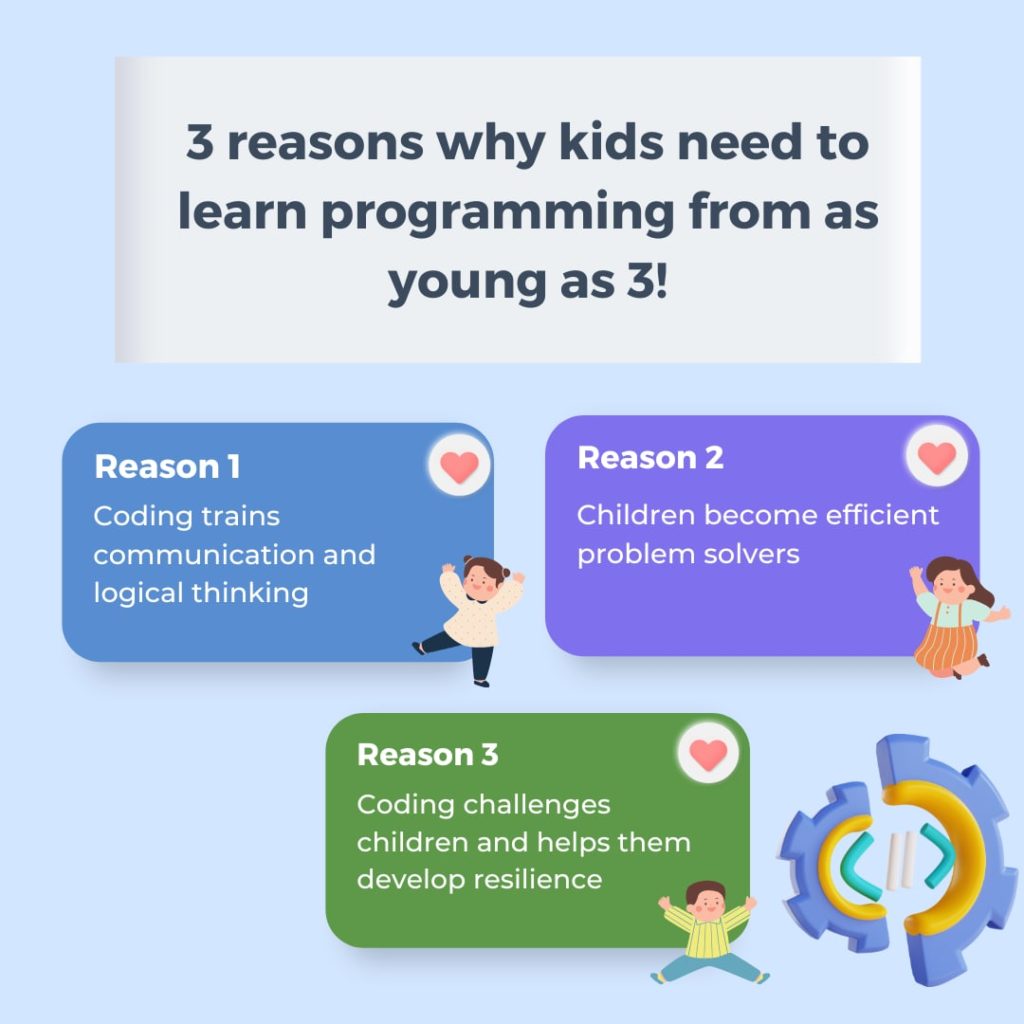As the world becomes increasingly digitized, the demand for software developers and technological experts are on the rise. Coding is now a key skill for future careers, and computational thinking is classified as one of the most valuable 21st century skills that children will need to be equipped with. Apart from the Tech industry, many professions ranging from accounting to medicine are already becoming more reliant on computer code.

Firstly, what exactly is coding?
Put simply, coding allows users to communicate with a computer. It is like learning another language, a language with a series of 0’s 1’s and different commands that the computer understands to perform specific functions. Coding enables people to do almost anything – it provides one with the freedom to create their own softwares, apps, websites and video games. It can also be used to automate processes, increasing the overall efficiency of businesses – and life in general. Hence, learning coding provides children with relevant and transferable skills, and trains them to develop a problem-solving mindset from an early age. Children who know how to code will also get a headstart with more employment opportunities set aside for them in the future. No matter the industry, companies look out for new hires with relevant computer science skills.
Introducing coding to kids whilst their brains are still developing allows them to develop a critical thinking and problem-solving mindset. Here are 3 main reasons why kids need to learn coding from a young age:
1. Coding trains communication and logical thinking
Coding teaches children another language. Language allows children to communicate properly and trains verbal and written skills. Like English or Chinese, coding is actually a language on its own. When children learn how to communicate with computers, they understand better why and how the gadgets and technology operate around them. They will get exposure to understanding the logical thinking behind the technology that they are using.
2. Children become efficient problem solvers
Understanding the basics of computer science allows children to appreciate how technology works around them. It fosters their creativity, logical and critical thinking. Learning to code teaches children how to think, not to just type lines of codes. In order to create an effective program, a programmer needs to think logically. They have to be able to break a large problem into smaller pieces and solve it in the most effective way possible. Hence, this allows children to be creative in exploring different options to solve problems as well. Creating a program or a game from scratch allows children the freedom to use their imagination, both to create the program and solve any bugs that come along the way. These skills not only lay the foundation for innovation, design thinking and leadership, but they also train kids to have a questioning mindset – one that encourages experimentation, a curiosity of how things work, and gives them the grit to explore challenging ideas. This allows kids to be creative innovators of the next generation.
3. Coding challenges children and helps them develop resilience
“ A computer is a bicycle for your mind” – Steve Jobs
In computer science, constantly failing with your code is entirely acceptable. There will always be bugs and mishaps that come along with your code. However, kids who learn coding from a young age develop a resilient mindset, and hence, are trained to view failures as opportunities for growth. As such, they develop greater ‘bounce’, are not afraid of challenges, and are far better at finding good solutions.
So, when is the right time to teach kids coding?
Being heavy consumers of technology, whether it’s watching Youtube or playing video games, children are already exposed to technology from a young age. Schools are also integrating coding and digital literacy as part of their curriculums. While such an early exposure might seem odd, Stack Overflow 2020 Developer’s survey results show that many kids start learning coding from as young as 3. In the future, coding is increasingly becoming a critical tenent of modern education.
Furthermore, coding teaches kids computational thinking. To put it simply, kids learn how to think efficiently like a computer. Hence, children gain a better understanding of algorithmic thinking patterns and logical thinking, which translate to a positive impact in their performance in both mathematics and science. With coding, kids can also learn to solve complex math and science problems in a more fun and engaging way. They can apply computer science principles and develop strong STEM skills to make them more future-ready.
I want my kids to be exposed to coding, but where do I start?
Sign up for FREE trials during our TechKids Open Day on 10 September 2022 and turn your children from passive technology consumers into innovative creators!
References:
https://teachyourkidscode.com/why-coding-is-important-to-learn/
https://techbootcamps.utexas.edu/blog/why-kids-should-learn-to-code/
https://funtech.co.uk/latest/why-coding-is-important-for-kids-7-reasons-all-parents-should-know
https://elearningindustry.com/k12-computer-science-coding-imagination
